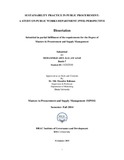Sustainability practice in public procurement: a study on public works department (PWD) perspective

View/
Date
2015-01-31Publisher
BRAC UniversityAuthor
Azad, Mohammad Abul KalamMetadata
Show full item recordAbstract
Sustainable procurement (SP) is procurement that is consistent with the principles of
sustainable development. Sustainable procurement is an approach that takes economic,
environmental and social sustainability into account when making any purchasing decision.
Public procurement is concerned with how public sector organizations spend tax payers’
money. Public procurement is guided by principles of transparency, accountability, and
achieving value for money for citizens and tax payers. Public Works Department (PWD) is
one of the biggest public procuring agencies for government in Bangladesh.
The current scenario of sustainable procurement practice in the public sector has been
studied through interviews with mid level procurement professionals from Public Works
Department (PWD) addressing three aspects of sustainability. The analyses indicate that
although there are a few cases where some sustainability issues are in practice, these are not
very common as a whole in the public sector. Existing tendering system in public sector in
Bangladesh is still based on the lowest price approach and whole life costing approach is
rarely considered. Hardly any procuring entity has any provision as such an environmental
management system. The study indicates that at present there is virtually no mechanism in
our public procurement system to check the environmental performance of contractors/
suppliers.
Sustainability criteria should be embedded in the tendering system. Knowledge and
awareness at the individual procurement professional level seem important in order to make
suitable sustainable procurement choices. The study reveals that the respondents are lacking
in such knowledge and they are not trained enough. A clear commitment is necessary from
the very top of government and down through the ministries and authorities formulating a
sustainable procurement policy and to align the public procurement framework with the
policy. Awareness campaign should be arranged focusing on how to take account of nonmonetary
benefits of sustainable procurement. Finally, there is scope to further study about
the sustainability issues in procurement. Advanced research needs to be conducted in order to
get a deeper insight into the sustainability issue in relation to the public procurement.
